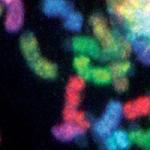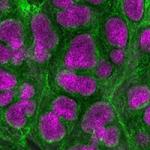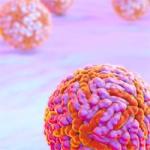
Research Topics
Molecular Genetics of an Imprinted Gene Cluster on Mouse Distal Chromosome 7
Genomic imprinting is an unusual form of gene regulation by which an allele’s parental origin restricts allele expression. Imprinting is critical for normal development, and recent studies have especially emphasized a role for imprinting in normal brain development and function (1). Imprinted genes are not randomly scattered throughout the chromosome but rather are localized in discrete clusters. One cluster of imprinted genes is located on the distal end of mouse chromosome 7 (Figure 1). The syntenic region in humans (11p15.5) is highly conserved in gene organization and expression patterns. Mutations disrupting the normal patterns of imprinting at the human locus are associated with developmental disorders and many types of tumors. In addition, inherited cardiac arrhythmia is associated with mutations in the maternal-specific Kcnq1 gene. We use mouse models to address the molecular basis for allele-specific expression in this distal 7 cluster. We use imprinting as a tool to understand the fundamental features of epigenetic regulation of gene expression. We also generate mouse models for the several inherited disorders of humans. We have generated models to study defects in cardiac repolarization associated with loss of Kcnq1 function and, more recently, characterized the phenotype associated with loss of Calsequestrin2 gene function.
Biography
Dr. Karl Pfeifer obtained his Bachelor of Science from the George Washington University, Washington, DC, in 1978 and his Ph.D. in Biology from the Massachusetts Institute of Technology, Cambridge, in 1988, under Dr. Lenny Guarente. He joined Dr. Shirley Tilghman at Princeton University as a Damon Runyon Cancer Research Foundation Fellow for postdoctoral training. He was recruited by the NIH in 1995.
Selected Publications
- Park KS, Rahat B, Lee HC, Yu ZX, Noeker J, Mitra A, Kean CM, Knutsen RH, Springer D, Gebert CM, Kozel BA, Pfeifer K. Cardiac pathologies in mouse loss of imprinting models are due to misexpression of H19 long noncoding RNA. Elife. 2021;10.
- Kean CM, Tracy CJ, Mitra A, Rahat B, Van Winkle MT, Gebert CM, Noeker JA, Calof AL, Lander AD, Kassis JA, Pfeifer K. Decreasing Wapl dosage partially corrects embryonic growth and brain transcriptome phenotypes in Nipbl(+/-) embryos. Sci Adv. 2022;8(48):eadd4136.
- Park KS, Mitra A, Rahat B, Kim K, Pfeifer K. Loss of imprinting mutations define both distinct and overlapping roles for misexpression of IGF2 and of H19 lncRNA. Nucleic Acids Res. 2017;45(22):12766-12779.
- Flores DJ, Duong T, Brandenberger LO, Mitra A, Shirali A, Johnson JC, Springer D, Noguchi A, Yu ZX, Ebert SN, Ludwig A, Knollmann BC, Levin MD, Pfeifer K. Conditional ablation and conditional rescue models for Casq2 elucidate the role of development and of cell-type specific expression of Casq2 in the CPVT2 phenotype. Hum Mol Genet. 2018;27(9):1533-1544.
- Eun B, Sampley ML, Van Winkle MT, Good AL, Kachman MM, Pfeifer K. The Igf2/H19 muscle enhancer is an active transcriptional complex. Nucleic Acids Res. 2013;41(17):8126-34.
Related Scientific Focus Areas




Molecular Biology and Biochemistry
View additional Principal Investigators in Molecular Biology and Biochemistry

This page was last updated on Friday, October 14, 2022